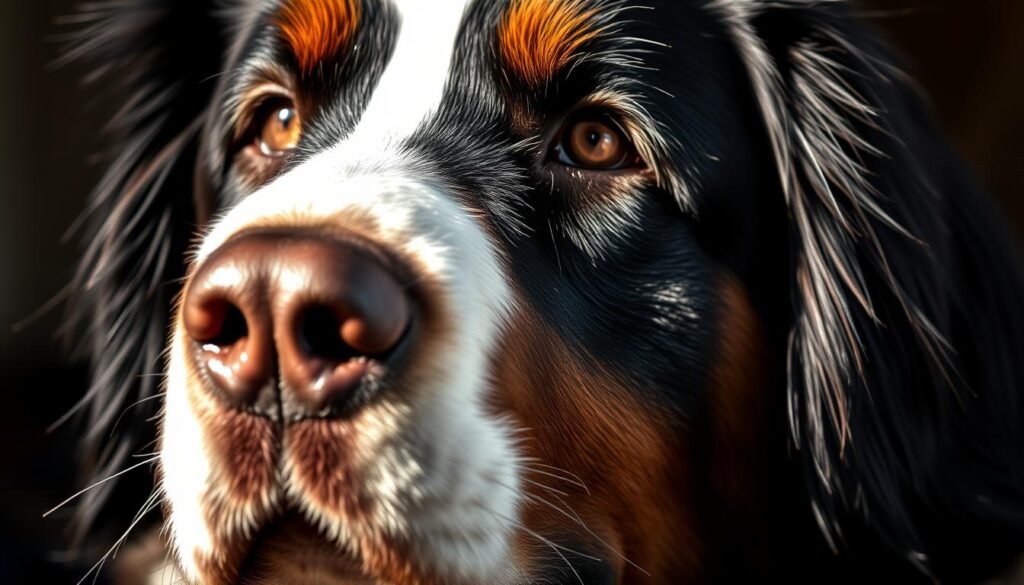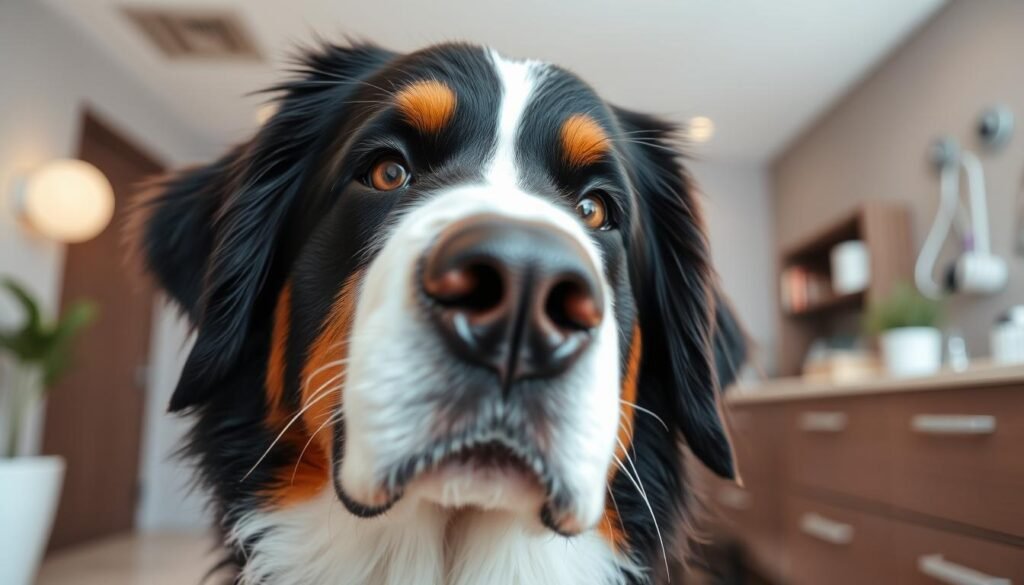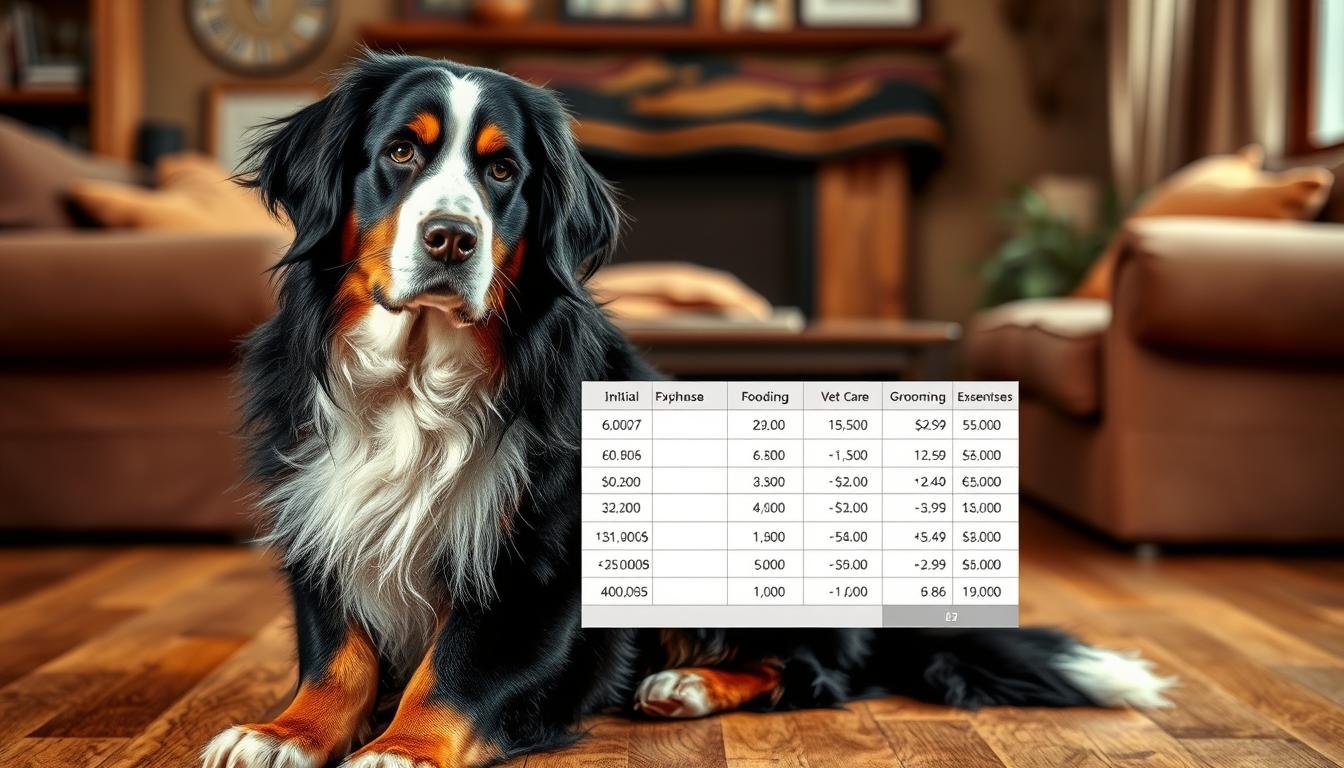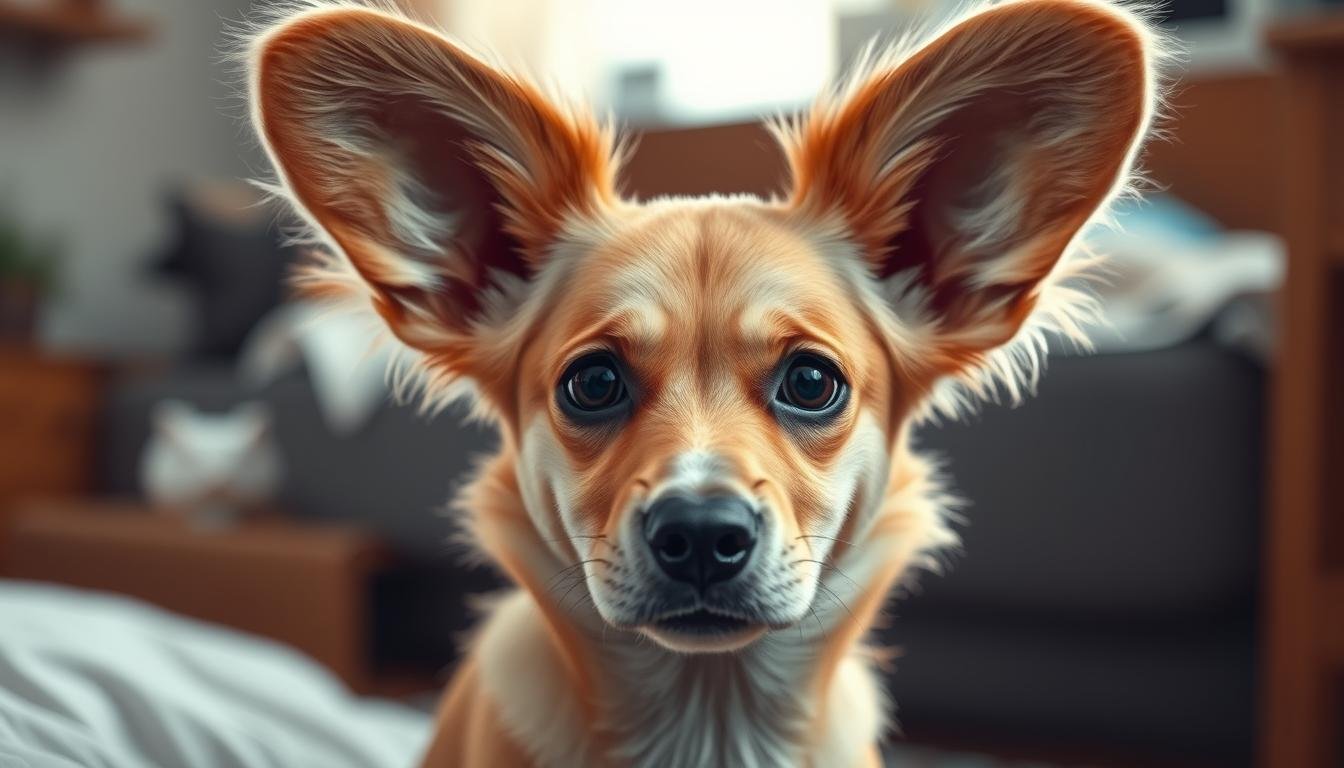That moment when you lock eyes with a tri-colored ball of fluff – it’s not just your heart that leaps. Your bank account starts doing somersaults too. We’ve all been there: caught between the magnetic pull of those soulful brown eyes and the cold reality of spreadsheets.
Owning one of these gentle giants isn’t like adopting a goldfish that forgets it’s been fed. It’s more like committing to a living, breathing SUV that sheds enough fur to knit sweaters for the neighborhood. From adoption fees that could fund a weekend getaway to food bills rivaling your grocery budget, we’re slicing through the financial fog of large breed ownership.
Whether you’re drawn to rescue organizations or premium bloodlines, the numbers might surprise you. That initial price tag? Just the appetizer. We’ll show you how yearly vet visits, gourmet kibble (because let’s face it – they’re food critics in fur coats), and surprise expenses add up faster than tennis balls disappear under the couch.
Key Takeaways
- Adoption fees range from $50-$500, while breeder prices span $700-$5,000+
- First-year expenses typically exceed $3,000
- Lifetime costs average $9,000-$33,000
- Insurance premiums vary based on coverage and location
- Unexpected medical costs often surprise new owners
Introduction to Our Bernese Mountain Dog Journey
Picture a 120-pound shadow that follows you everywhere – including into the shower. That’s life with these Swiss-born marvels. Our guide cuts through the fluff (literally) to reveal what mountain dog ownership truly costs beyond the Instagram-perfect snow scenes.
What This Buyer’s Guide Covers
We’ve mapped every dollar-sinking quirk of the breed. From chew-proof furniture investments to the shampoo industrial complex required for their glorious coats. Our table breaks down reality versus expectations:
| Expense Category | Initial Estimate | Actual Cost |
|---|---|---|
| Food | $80/month | $140/month |
| Toys | $20/month | $45/month |
| Grooming | $75/session | $110/session |
Our Personal Experience and Insights
Our first mountain dog taught us three truths: 1) “Waterproof” dog beds are lies 2) Vets adore their genetic complexity 3) That wagging tail demolishes coffee tables. We’ve converted our financial bruises into actionable advice for new owners.
These gentle giants bond like Velcro – prepare for joint bank accounts with your groomer and pet store. But when yours rests a snowshoe-paw on your lap during movie night? Every cent feels like a bargain.
Understanding how much is a bernese mountain dog

Ever wonder why some puppies cost more than a tropical vacation? The answer lies in three letters: DNA. These gentle giants carry price tags as varied as their personalities, influenced by everything from medical clearances to whether their ancestors won Best in Show.
Factors That Influence the Price
Breeder credentials act like Yelp reviews for puppies – top-rated ones charge premium rates. Geographic location matters too; urban areas often have prices 20% higher than rural regions. Health testing is the real game-changer – those OFA certifications? They’re basically puppy college degrees.
Price Range Overview
Your wallet’s destiny depends on sourcing:
| Source | Cost Range | Perks Included |
|---|---|---|
| Rescue Groups | $50-$500 | Vaccinations, spay/neuter |
| Reputable Breeders | $700-$2,000 | Health guarantees, pedigree docs |
| Show Lines | $2,500-$5,000+ | Champion bloodlines, show potential |
Rescues offer budget-friendly options, though availability’s scarcer than a clean white couch in a shedding season. Mid-range breeders provide the sweet spot between cost and quality. The luxury tier? That’s for owners who want their companion to arrive with better credentials than a Harvard grad.
Remember: initial costs are just the down payment. Whether you’re adopting a shelter sweetheart or investing in future Best in Show material, you’re buying into a decade of slobbery grins and heart-melting head tilts. Priceless? Absolutely. Free? Not even close.
Initial Expenses: Puppy Purchase & Home Setup
Transforming your living space for a Bernese Mountain Dog feels like prepping for a tiny, furry tornado with impeccable taste. Their arrival demands more than just enthusiasm – it requires strategic budgeting for creature comforts that’ll survive their rapid growth spurts and boundless curiosity.
Adoption Versus Breeder Costs
Choosing between rescue groups and breeders is like picking between thrift-store treasures and custom-tailored suits. Rescue fees ($50-$500) often include starter medical care, while breeder prices ($700-$5,000+) come with genetic testing and lineage bragging rights. We’ve seen both paths work beautifully – provided you budget for the hidden fees lurking behind those soulful eyes.
Essential Supplies for Your New Puppy
Your shopping list needs military precision:
- Crash-tested crate (think “luxury studio apartment” size)
- Industrial-grade chew toys that laugh at puppy teeth
- Grooming arsenal capable of managing a fur factory
First-year setup costs hit $250-$1,000, but skimp at your peril. That “bargain” leash? It’ll snap faster than you can say “squirrel!”. Smart investments include microchipping ($50-$75) and vaccination rounds ($75-$100) – consider them insurance against your pup’s inevitable escape artist phase.
Pro tip: Buy the adult-sized bed immediately. These living snowballs outgrow puppy gear faster than TikTok trends.
Monthly Expenses: Food, Grooming & More

Welcome to the gourmet buffet line and salon experience your furry companion demands. While initial adoption fees fade from memory, these monthly costs stick like burrs in a double coat.
Nutritional Needs and Quality Food Choices
These canine foodies require premium fuel. Quality kibble isn’t optional – their sensitive stomachs and joint health demand it. Our comparison shows why budget brands crumble:
| Food Type | Monthly Cost | Annual Impact |
|---|---|---|
| Standard Kibble | $20-$35 | Potential vet bills |
| Premium Formula | $40-$50 | Healthier coat/joints |
As one groomer quipped: “Their coats reflect what’s in the bowl – dull food means dull fur.” We learned this through trial (and many errors) with picky eaters.
Grooming Sessions and Routine Maintenance
That glorious coat becomes a liability without proper care. Professional grooming every 6-8 weeks ($60-$100/session) prevents matting disasters. Our maintenance breakdown:
- Brushing: 3x weekly (unless it’s shedding season – then daily)
- Nail trims: $15-$25 monthly
- Emergency baths: Priceless (when they discover mud puddles)
New owners often underestimate the monthly cost to own a Bernese Mountain. Between specialty shampoos and de-shedding tools, that fluffy appearance comes at a premium.
“Grooming a Bernese isn’t maintenance – it’s an art form requiring patience and industrial-grade vacuums.”
Yet watching your freshly coiffed companion prance? Worth every penny and stray hair in your morning coffee.
Health, Wellness, and Veterinary Care Considerations

Owning one of these fluffy companions is like having a luxury car – breathtaking to behold, but the maintenance will make your wallet weep. Beneath those soulful eyes lies a genetic predisposition for conditions that’ll have you swapping vacation funds for vet bills faster than they shed winter coats.
Common Health Challenges and Costs
Three conditions dominate veterinary charts: hip dysplasia ($500-$10,000+), elbow dysplasia ($2,000-$3,500), and the ominously named “bloat” requiring $1,500-$3,000 emergency surgery. Their average lifespan of 7-10 years – shorter than many breeds – turns every birthday into a bittersweet celebration.
Preventative Measures and Routine Check-ups
We’ve adopted a three-pronged defense strategy: bi-annual vet check-ups, joint supplements thicker than our morning smoothies, and obsessive food-bowl elevation to combat bloat risks.
“Catching issues early is cheaper than financing a canine ICU stay,”
notes our veterinarian, who now texts us pet memes between appointments.
Smart owners treat prevention like a part-time job. Weight management becomes calculus, treat portions turn into science experiments, and that “harmless limp” warrants faster action than a toddler near an open fridge. Yet through it all? These gentle giants keep wagging – proof that health investments buy more than time. They purchase moments.
Choosing the Right Breeder and Ethical Considerations
Selecting a breeder feels like conducting a corporate merger where the CEO has four legs and a wagging tail. The process demands Swiss watch precision – one misstep could lead to a decade of heartache (and vet bills).
Evaluating Breeder Reputation and Credentials
Top-tier breeders come with puppy resumes thicker than winter coats. Expect full health clearances for both parents, genetic testing documentation, and contracts outlining spay/neuter requirements. We’ve seen quality breeders provide everything but paw-print notarized documents.
Reputable professionals at certified Bernese Mountain Dog breeders will:
• Insist you meet the canine parents
• Share multi-generational health histories
• Offer post-adoption support hotter than fresh baked treats
Red Flags and Warning Signs
Sketchy breeders stick out like cats at a dog show. Beware of:
• Prices lower than a chew toy budget
• Missing health certifications
• Rush-job transactions
True ethical breeders invest more in health screenings than most people spend on car maintenance. Their passion shows in every detail – from temperament-matched placements to lifelong guidance. Because when you’re committing to a decade of love (and drool), only gold-standard practices will do.




